By Laurie Laker ’12
At CC, we talk a lot about “pioneering spirit.” Our history demands it, our location inspires it, our way of learning embraces it. The life and career of Professor Emerita Jane Cauvel embodies that pioneering spirit, perhaps more than any other professor in the history of the college.
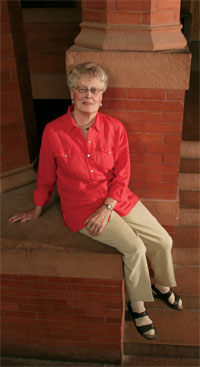 With a career spanning eras of great change for the college and the world, Cauvel’s legacy as a brilliant trailblazer is assured. The native of Walla Walla, Washington, armed with degrees from Washington State University (B.A., 1951) and the University of Hawaii (M.A., 1953), joined the Colorado College Philosophy Department in 1960. She was the first woman to be hired by the department, toppling the first of many barriers in her career.
With a career spanning eras of great change for the college and the world, Cauvel’s legacy as a brilliant trailblazer is assured. The native of Walla Walla, Washington, armed with degrees from Washington State University (B.A., 1951) and the University of Hawaii (M.A., 1953), joined the Colorado College Philosophy Department in 1960. She was the first woman to be hired by the department, toppling the first of many barriers in her career.
Brought to CC to introduce Asian philosophies to the college, Cauvel swiftly revitalized the scope and depth of the department. Earning her Ph.D. from Bryn Mawr College in 1962, Cauvel’s star rose quickly at CC. In the early-1960s, deluded and discomforted by traditional patterns of western dominance across numerous fields, many young students began to take an interest in Eastern philosophies. Cauvel was instrumental in bringing these traditions of thought to the college, actively supporting the formation of the Asian Studies program at Colorado College — first offered in the fall of 1964. Furthermore, Cauvel helped pioneer the Women’s Studies program at CC, which later became the Feminist and Gender Studies Department that exists today.
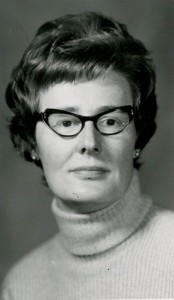 In 1968, Cauvel broke ground again — becoming the first woman to chair the department. She held this position until 1974-75, when she was awarded the prestigious Benezet Faculty Rotating Fellowship. This fellowship allowed Cauvel to take the year off to study interdisciplinary programs around the country, assisting both her own teaching as well as the improvements that Colorado College continued to make. A big supporter of interdisciplinary work, having co-taught courses with biology, anthropology, and history professors for many years, Cauvel’s research fell under that same interdisciplinary umbrella. Interested in the prospects of interdisciplinary students, her research concluded that these students had no more difficulty in attaining admission to graduate programs than any other, more traditional, students. Additionally, while taking time off from teaching, Cauvel also collaborated on a book.
In 1968, Cauvel broke ground again — becoming the first woman to chair the department. She held this position until 1974-75, when she was awarded the prestigious Benezet Faculty Rotating Fellowship. This fellowship allowed Cauvel to take the year off to study interdisciplinary programs around the country, assisting both her own teaching as well as the improvements that Colorado College continued to make. A big supporter of interdisciplinary work, having co-taught courses with biology, anthropology, and history professors for many years, Cauvel’s research fell under that same interdisciplinary umbrella. Interested in the prospects of interdisciplinary students, her research concluded that these students had no more difficulty in attaining admission to graduate programs than any other, more traditional, students. Additionally, while taking time off from teaching, Cauvel also collaborated on a book.
When she returned to the department at the start of the 1976-77 academic year, she resumed her position as chair, holding it until 1979. As chair, Cauvel guided her department through periods of great growth. With her fellow faculty, the department built under her watch continues to thrive and prosper. Hiring professors like John Riker, Hans Krimm, Harvey Rabbin, and Judith Genova, Cauvel’s work as chair is still visible and resonant today, laying the foundations of the college’s reputation for deep and independent thinking.
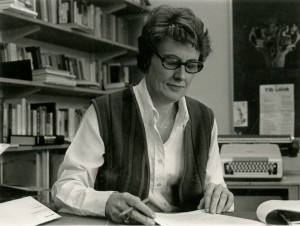 As CC continued to develop, so did Cauvel’s range of experiences and expertise. In the summer of 1965, she was one of 20 scholars from across the U.S. awarded a Fulbright-Hays Grant to attend the Summer Institute in Indian Civilization in New Delhi, India. While in India, Cauvel studied the educational, philosophical, and political developments in India with Indian scholars, including Indira Gandhi – later the first and only female Prime Minister of India. Additionally, Cauvel reported back to the college community on the burgeoning conflict in Vietnam, providing a unique, simultaneously immediate and removed, lens on the events of the time. Back at CC, protests sprung up often, the counterculture movement having taken hold of the country during the early- to mid-1960s.
As CC continued to develop, so did Cauvel’s range of experiences and expertise. In the summer of 1965, she was one of 20 scholars from across the U.S. awarded a Fulbright-Hays Grant to attend the Summer Institute in Indian Civilization in New Delhi, India. While in India, Cauvel studied the educational, philosophical, and political developments in India with Indian scholars, including Indira Gandhi – later the first and only female Prime Minister of India. Additionally, Cauvel reported back to the college community on the burgeoning conflict in Vietnam, providing a unique, simultaneously immediate and removed, lens on the events of the time. Back at CC, protests sprung up often, the counterculture movement having taken hold of the country during the early- to mid-1960s.
In 1970, Colorado College adopted the Block Plan — an academic structure that would swiftly revolutionize the reputation and culture of the college. Keen on issues of education access and opportunity, Cauvel was a candid voice of constructive criticism as the Block Plan was devised, developed, and implemented. Speaking often on both its benefits and limitations, her cool head and considered viewpoints marked her as both a local, and soon-to-be national, leader.
Cauvel is a woman who has more firsts to her name and career than most. As the war in Vietnam came to a close in the mid-1970s, the U.S. Army came to realize the scale of the issues facing their thousands of young service personnel. In 1977, as the first woman appointed to the Advisory Committee of Civilian Educators, Cauvel and the committee recommended ways to improve the Army Command and General Staff College (CGSC) educational program and to act as a governing board to the school.
Such was Cauvel’s renown as a teacher that in 1987, she received the Burlington Northern Foundation Faculty Achievement Award. Recognizing consistent excellence, as well as significant and meritorious achievements in teaching, the award was presented at a ceremony of Cauvel’s peers from across the country.
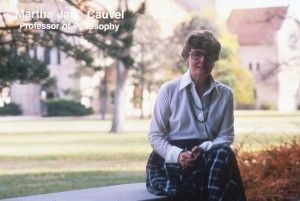 A champion of women’s and minority rights throughout her life and career, Cauvel spoke often at the Benet Hill Academy, now Benet Hill Monastery, on the rights and ambitions of young women — once even acting as their keynote speaker for graduation. At Colorado College, she helped establish the Interdisciplinary House, which today is home to the Asian Studies, Feminist and Gender Studies, and Race, Ethnicity, and Migration Studies departments. Startlingly, she was the only female full professor at the college until the 1994-95 academic year, when seven female full professors joined the teaching staff.
A champion of women’s and minority rights throughout her life and career, Cauvel spoke often at the Benet Hill Academy, now Benet Hill Monastery, on the rights and ambitions of young women — once even acting as their keynote speaker for graduation. At Colorado College, she helped establish the Interdisciplinary House, which today is home to the Asian Studies, Feminist and Gender Studies, and Race, Ethnicity, and Migration Studies departments. Startlingly, she was the only female full professor at the college until the 1994-95 academic year, when seven female full professors joined the teaching staff.
In the 1990s, she invited Li Zehou, one of China’s foremost philosophers, to teach courses in both Chinese and Western aesthetics. Li Zehou, widely regarded as China’s leading scholar of modern intellectual history and philosophy, was placed under house arrest for three years in the aftermath of the Tiananmen Square massacre before emigrating to the U.S. as a permanent resident in 1991. Cauvel and Zehou, cohorts in discipline and interests, co-authored a book together in 2006, “Four Lectures on Aesthetics: Toward a Global Perspective,” which is used by scholars and students interested in Chinese aesthetics.
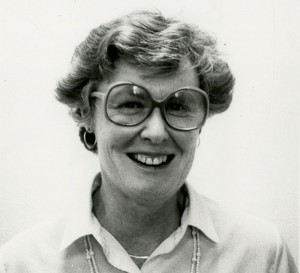 After 35 years as a faculty member at Colorado College, Cauvel retired from teaching at the end of the 1994-95 academic year. Having moved to an administrative position within President Mohrman’s office the previous year, Cauvel served as her assistant until the end of the 1995/96 academic year. Upon her retirement, a celebration was held at the president’s house, and President Kathryn Mohrman — the first female president of the college — led the many in attendance in expressing their gratitude and appreciation for her tenure.
After 35 years as a faculty member at Colorado College, Cauvel retired from teaching at the end of the 1994-95 academic year. Having moved to an administrative position within President Mohrman’s office the previous year, Cauvel served as her assistant until the end of the 1995/96 academic year. Upon her retirement, a celebration was held at the president’s house, and President Kathryn Mohrman — the first female president of the college — led the many in attendance in expressing their gratitude and appreciation for her tenure.
Cauvel wasn’t done with CC just yet, though! From 2010 until 2012, she returned to the college as CC’s first ombudsperson. Acting as an informal and confidential resource for faculty and staff, the ombudsperson’s role is to help resolve workplace and learning environment issues through neutral discussion and conflict identification. In short, Cauvel continued working as she always has — to help the community she loves.
 Over five decades, now, Jane Cauvel has been a teacher, mentor, and friend to many at Colorado College. A scholar of great renown, her teaching career alone would be enough to warrant celebration. What she did, and continues to inspire, for women in academia at Colorado College, is unprecedented. We are honored to celebrate Jane Cauvel here, and we hope you’ll join us in paying a long-overdue tribute to an astonishing individual.
Over five decades, now, Jane Cauvel has been a teacher, mentor, and friend to many at Colorado College. A scholar of great renown, her teaching career alone would be enough to warrant celebration. What she did, and continues to inspire, for women in academia at Colorado College, is unprecedented. We are honored to celebrate Jane Cauvel here, and we hope you’ll join us in paying a long-overdue tribute to an astonishing individual.
Share your anecdotes and recollections about this wonderful member of our community!
If you have photos of Jane to share, please email them to communications@coloradocollege.edu.
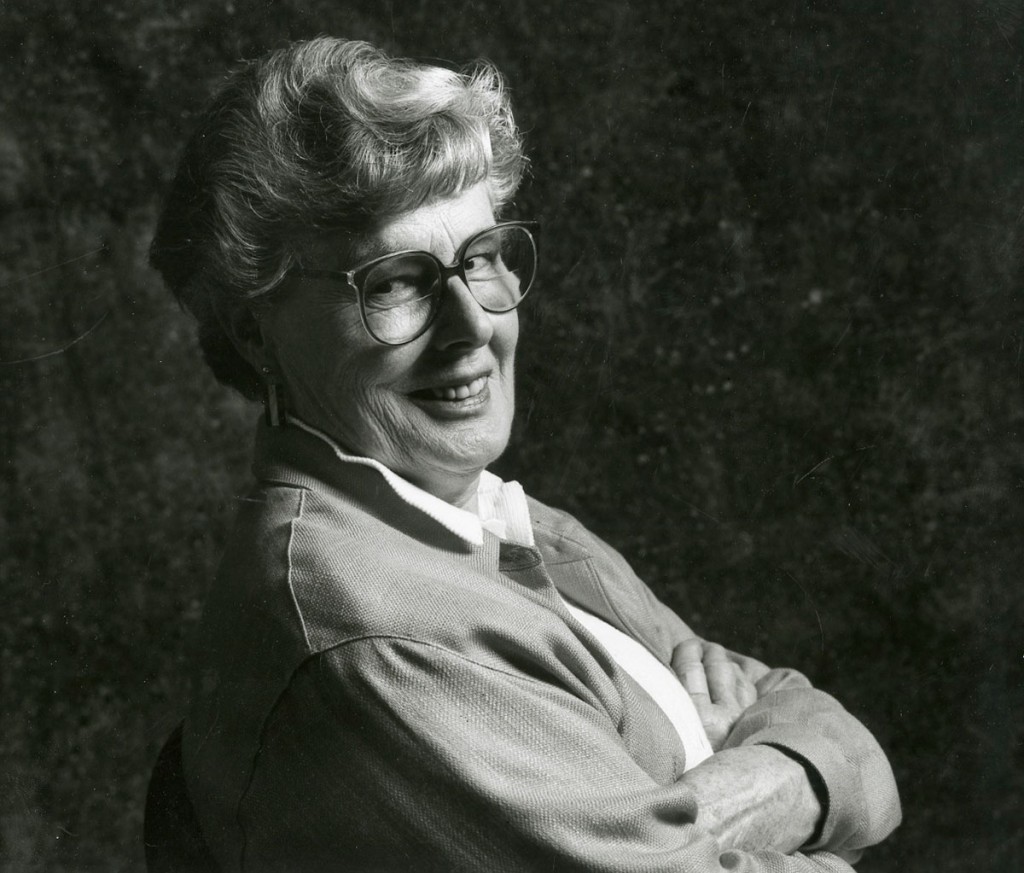
8 Responses to Professor Emerita Jane Cauvel
I was one of two males in Jane’s Philosophy of Feminism class in ’87. We read Beauvoir, Gilligan, Daly. But, 30 years later, the most influential book on the syllabus, for me, was “Egalia’s Daughters,” a disstopian novel about a young “manwom” coming of age in a Matriarchal society. I continue to suggest it to friends and relatives. I often sat opposite Professor Cauvel, and my main memory of her in our class-room time is of a quite presence who would allow the students struggle with the ideas being presented. Oh, yeah, and after showing us a movie with Treat Williams and Laura Dern, James Taylor’s “Handy Man” will never be the same for me!!
Thank you Jane,
Bill
I was a second semester freshman in 1964 when I enrolled in an introductory philosophy class taught by Jane. Her thoughtful approach — balancing her lectures with leading us to discover important concepts on our own — was not just valuable but memorable. Many years later, as a Trustee member of the Board’s Audit Committee, I was especially pleased when we selected Jane as a person with both the experience and the integrity to perform a sensitive and important role as CC’s first omsbudsperson. And, as one would expect, she excelled in that position. Thank you, Jane, for all you have done for CC!
Bill
Jane, you are a true warrior! Thank you for all of the support you have given me through all the battles. You will always have a place in my heart.
Sincerely,
Cecelia
I came to C.C. in 1976, and Jane immediately took on the task of being my mentor, long before we ever thought to have mentors for incoming faculty. She was one of the very few woman professors here at the time, and gave me the encouragement and confidence, both of which I needed, to continue to thrive here. Her mentorship was life saving. For many years we had lunches for the very few tenured women faculty around a little table in her house, and pledged our will for the day that there would be too many tenured women faculty to sit around the table and we would have to disband, and it happened!
Jane hired John Riker, my husband of 35 years, and also introduced us to Shelties. When we were thinking about buying a dog for our nine year old Sophia, Jane convinced us that a Sheltie would be our best choice, and during our lifetime we have had seven of them, sometimes four at once! They enrich our lives.
Whenever there is a crisis to work through or an honor to be celebrated, Jane is always there. She is a woman of dignity, faithfulness, and great integrity, who has indeed been a pioneer for multiculturalism and women studies at Colorado College.
Thank you, Jane, for all you have given and continue to give!
With much affection,
Marcia
Hi Marcia – I was the General Books/Special Orders person in the CC Bookstore from 1988 to 2008. I had retired from teaching and Jo Orsborn persuaded me to come work for her for a “few” years.
I recently had to say goodbye to my little 13 year old rescue Sheltie named Maidel. My heart is hurting- and my home needs a Sheltie! I have been told that you and your family are fellow Sheltie lovers. Would love a recommendation on finding a Sheltie. I do have my name on Sheltie rescue sites and would also be interested in finding a reputable breeder. Would appreciate any input you could offer!
Sincerely,
Alicia Greis
Kudos to you Jane for all your achievements and well deserved awards. I knew you at WSC (now WSU). I and my family became friends with your parents when we lived in Walla Walla.. All that was many years ago but I wanted to say “hi” to you and your adorable dogs.
Willie (Willoma Erickson) Stout
Dear Jane,
There are few specific conversations with a professor that I can still recall. One that I’ve chewed on for my entire career was a conversation with you. It has followed me through an M.A. thesis on aesthetics in music, to my movement from philosophy to theology in my (2nd career) M.Div.
You gave serious attention to my naive first articulation of a concept that has occupied me to this day. I thank you.
I loved your course. It seems the wider community has recognized your gift for teaching. Brava!
Robin Lostetter 1970
Dear Jane, I was telling my friend tonight about the interesting car trip you and I took from Moscow, Idaho to New York in 1954, you in your way to Bryan Mawr and I at age 17, to be a freshman at Vassar. Congratulations on your stimulating and shining career! I retired from a community development position in Spokane with WSU, after careers in Mathematics, psychology and parenting. Music has been my soul food. I started a community chorus, was the events coordinator and play in a ukulele orchestra in our small village near Palm Springs, California. I have two children, two late husbands and a current companion.
We love to hike, read and swim in our natural hot springs. I will be 86 this April. I hope you are well and happy. Your friend from long ago.
Marilyn Trail